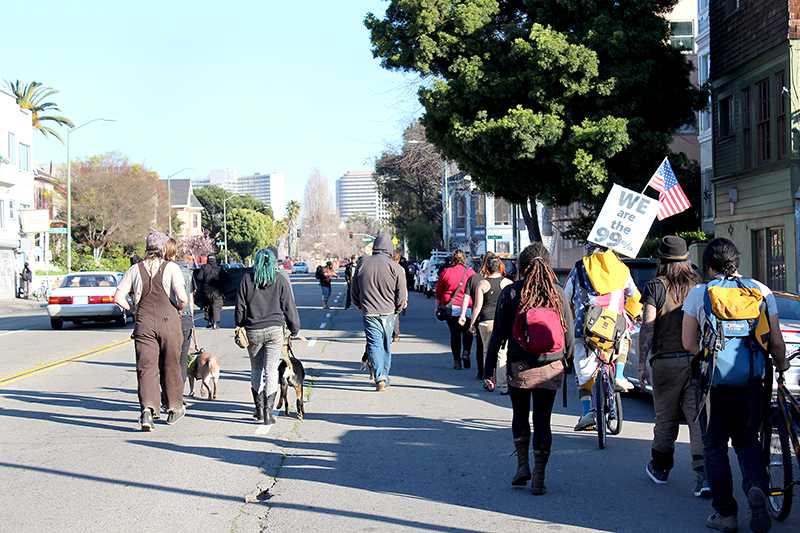Residents protest Oakland’s proposed citywide surveillance system
Residents protest Oakland’s proposed citywide surveillance system
Chanting protestors filled the DeFremery Recreation Center park in West Oakland Saturday to march against a proposed centralized citywide surveillance system that will be connected to Oakland Unified School District cameras, transit and traffic cameras, police dashboard cameras, and Port of Oakland cameras.
A group calling themselves the March 15 Organizing Committee held the march in opposition to the Domain Awareness Center, a $10.9 million surveillance system that would be funded by federal grants and implemented by a military contractor.
The protestors began with a rally in DeFremery’s park before moving through the streets of West Oakland to 17th Street and Martin Luther King Jr. Way, where the proposed DAC faculty would be built.
“I heard that there was going to be a rally against the putting surveillance into the community and I hope that this march will turn heads,” said marcher Mega, who declined to share her full name.
Since the DAC was proposed in 2008, protests, demonstrations and marches have taken place and petitions have been circulated in opposition.
Oakland City Council members suggested that the DAC would secure the Port of Oakland against maritime terrorist attacks. But after many changes and discussion, the plan scaled into a surveillance center aggregating feeds from all over the city.
A $2.2 million federal grant was offered to the city in 2008 to begin building the DAC. By July 9, 2013 the Oakland Public Safety Committee unanimously passed a vote accepting the funding. By the end of July, the city council moved to approve the grant. Oakland City Council told residents the DAC would not be activated 24/7 until privacy guidelines and data retention polices were developed and voted on by the council no later than March 2014.
The city plans to spend $1.2 million a year to staff the DAC. A public records request elicited 3,000 pages of emails on the topic.
“Oakland’s long history of civil discourse and protest adds to the need for the Domain Awareness Center,” wrote Renne Domingo, head of the DAC team. Her response only ignited more opposition from protesters.
Since the unanimous city council vote last year on July 30, there have been debates and more hearings between Oakland City Council members and residents.
The city council initially hired military contractor, Schneider Electric, in Nov. 2013, but a cease and desist was issued by the Oakland Privacy Working group Jan. 27, 2014 in violation of Oakland’s Nuclear Free Zone ordinance. The ordinance declares the city of Oakland a nuclear fee zone and regulates nuclear weapons work as well as city contracts with nuclear weapons makers.
Oakland residents voiced their opposition of the DAC in a three-hour city council meeting Feb. 18, and the council members tabled the issue until March 4.
Much like the privacy activists who held protests downtown and in front of city hall early February, the March 15 Organizing Committee hopes that this demonstration gets the attention of not only city council members but also other Oakland residents in time for the meeting on March 4.
As March 15 approaches, one of the leading coordinators of the March 15 Organizing Committee, Glenn, who declined to share his last name, aspires for the march to grow bigger by organizing demonstrations on local issues in Oakland every Saturday leading up to March 15.
The March 15 Organizing Committee plans to march against the DAC again, this time on Broadway and 14th Street on March 1.
“March 15 is a day that gives the opportunity for a lot of people to speak out, and I think, especially in Oakland people would like to speak out against police brutality,” says Glenn, “Because it is something that is happening across the country, across the world, but Oakland has a harsh history.”











